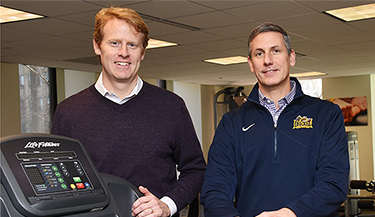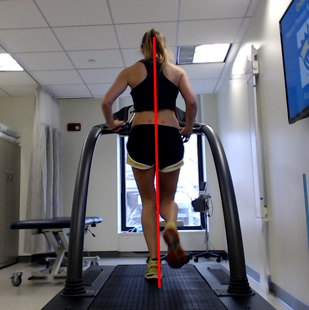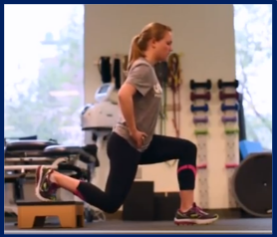Leveraging decades of experience and professional practice, our running specialists, who are also expert physical therapists, use technology-infused video analysis and physical examination to create an individualized training program to help you accomplish your goals. Through this collaborative process, we help individuals recover from injury, prevent injury, and meet personal bests.
The Running Gait Analysis program provides runners with a complete examination of their running mechanics, strength, flexibility, core stability, and movement patterns. The program is designed for runners of all ages and ability levels, and includes athletes who engage in running during sport or training (field and endurance athletes).
 Using innovative technology, we provide both data-driven and practice-driven recommendations to individuals who are seeking to prevent injury, recover from an injury, and/or striving to meet a particular goal. We listen carefully and collaborate with each individual to determine the most productive recommendations.
Using innovative technology, we provide both data-driven and practice-driven recommendations to individuals who are seeking to prevent injury, recover from an injury, and/or striving to meet a particular goal. We listen carefully and collaborate with each individual to determine the most productive recommendations.
Video analysis allows our physical therapists to observe and measure the mechanics of how you run in slow-motion. The evaluation takes about 60-minutes and consists of a review of training and injury history, a musculoskeletal exam, including strength, flexibility, posture, anatomical alignment, core stability and movement analysis. This is followed by video capture of the runner in action from multiple angles. We utilize motion analysis software to measure critical aspects of the runners’ mechanics. The results of the analysis are compiled in a comprehensive report, including recommendations.
Recommendations could include focused exercises, modification of running form, training changes, and suggestions for proper shoe selection. We will use our findings to develop a customized program directed at improving your performance and helping you prevent running injuries.
Running Mechanics Exam
Our team of physical therapists specializing in running biomechanics and running injuries will assess your strength, flexibility, dynamic core stability and perform a video gait analysis using specialized motion analysis software. We will analyze data from the running questionnaire, musculoskeletal assessment, and video analysis in order to create a comprehensive results package.
This program is designed for runners and triathletes of all ages and skill levels with the goals of injury prevention and performance enhancement. Our expert analysis can detect faulty running mechanics that may lead to injury as well as identify factors the athlete can modify to train more effectively and to improve running performance.

 Robert Maschi, PT DPT, OCS, CSCS
Robert Maschi, PT DPT, OCS, CSCS
Dr. Maschi is a Physical Therapist, Board-Certified Clinical Specialist in Orthopaedic Physical Therapy (OCS), Certified Strength and Conditioning Specialist (CSCS) and faculty member in the Department of Physical Therapy and Rehabilitation Sciences. Rob has been in clinical practice for over 25 years and is a life-long runner, competing in marathons and races of all distances. He specializes in working with the running community and is involved in research related to running biomechanics and the prevention of injury in runners.
 Kevin Gard, PT, DPT, OCS
Kevin Gard, PT, DPT, OCS
Dr. Gard is a Physical Therapist and Board-Certified Clinical Specialist in Orthopaedic Physical Therapy (OCS). He has been active in clinical practice for almost 30 years and has a special interest in runners and running biomechanics. Kevin is Director of the Doctor of Physical Therapy program and Vice-Chair of the Department of Physical Therapy and Rehabilitation Sciences at Drexel University. A runner himself, Kevin has completed 9 marathons including the Boston marathon twice as well as numerous races of other distances.
Should You Change Your Stride Length?
Periodization: Running with a Purpose
Running in the Age of Coronavirus
A Complete Guide to Shin Splints
Strength Training Exercises For Runners
Dynamic Warm Up for Runners
How Running Analysis Can Help You Return to Running
What Makes up a Good Running Analysis?
Fix Your Running Form
10 Tips for the 10 mile Broad Street Run
Tips for Beginner Runners
Get the right shoes. Feet come in all shapes and sizes so try several shoes to see which pair feels the best on your feet. Also, get expert advice about what type of shoe is most appropriate for your foot structure and the way your foot moves while running. This is best done by having a video analysis of your running gait. Physical therapists are experts in movement analysis and a PT with experience in this area is your best bet for guidance in finding an appropriate shoe. (contact Drexel University Running Performance and Research Center for a Running Analysis at http://drexel.edu/cnhp/practices/Running- Performance-and-Research-Center/ )
Don’t worry about pace. When you first start it may be difficult to maintain a fast pace. As you build endurance this will become easier and you will be able to increase your running distance and pace. A good way to start is by using a run / walk method. Run for a short period of time and then walk until you are feeling ready to run again. Gradually decrease the length and number of your walking breaks.
Build mileage gradually. Increase your weekly running volume slowly. There is a commonly quoted “10% rule” that seems to bear out. It suggests runners should refrain from increasing total mileage more than 10 % from week to week. Although the truth of this rule is debated, there is scientific evidence that increasing by larger volumes (more than 30% over two weeks) is related to increased risk for development of a running injury. So it seems wise to increase mileage gradually.
Keep a training log. Keeping track of your running miles helps you plan out your training, count miles, allow for rest days and helps keep you focused on your goals.
Plan for recovery. Take rest days from running to allow your body to recover from the demands placed on it. You can incorporate active rest or cross train on non-running days. Utilize activities such as biking, swimming, weight training, yoga or pilates to improve your overall fitness and to let your body recover.
Join a run group or find a running partner. Running with others can be motivating and social. On those days when you don’t feel like getting out for a run, a partner or team can be the boost you need. Also, use your running partners or team as a resource to discuss training ideas, share information or plan upcoming races.
Have fun. Find the right group of runners, the location and the pace that works for you. Make it an enjoyable experience so that it becomes a lifestyle change that you can continue to participate in for years to come.
Gift certificates are available
Running Analysis with Comprehensive Report

During this one-hour session, you meet with an expert physical therapist, who specializes in running, for a review of your training program and injury history. You will have a full assessment of strength, flexibility, core strength, functional movement testing related to running. Additionally, we leverage specialized video software to analyze your running mechanics. Following the visit, you will receive a detailed report with recommendations.
$250

Follow up visit: Video Analysis
Designed to be a 45-minute follow-up to the Running Analysis, this service includes a meeting with a physical therapist, who specializes in running, to perform an additional video running analysis to determine if initial recommendations for running form modifications have been successfully incorporated. This follow-up analysis can also offer assistance with modification of running mechanics (real-time gait retraining).
$100
Fix Your Run Package- Two Sessions

This package combines the Running Analysis and follow up video analysis into one package.
During your first one-hour session, you meet with an expert physical therapist, who specializes in running, for a review of your training program and injury history. You will have a full assessment of strength, flexibility, core strength, functional movement testing related to running. Additionally, we leverage specialized video software to analyze your running mechanics. Following the visit, you will receive a detailed report with recommendations.
During your second 45-minute follow-up session to the Running Analysis, this service includes a meeting with a physical therapist, who specializes in running, to perform an additional video running analysis to determine if initial recommendations for running form modifications have been successfully incorporated. This follow-up analysis can also offer assistance with modification of running mechanics (real-time gait retraining).
This is a $50 savings when purchased together.
$300
Follow up visit: Exercise Program Review

Runners who would like to review their exercise program prescribed from the Running Analysis by our physical therapist can come for a 30-minute review session to ensure they are performing their program correctly.
$50